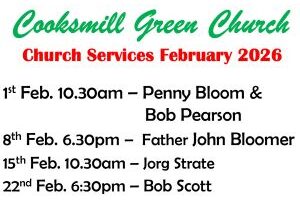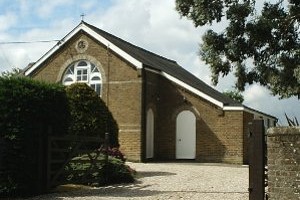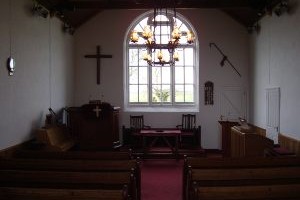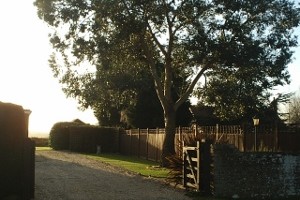Thought for the week 15th Nov 2020 – With a nod to St. Gertrude

(Feast Day of St Gertrude 16th Nov.)
What is it about “Onward Christian Soldiers” that gets people, well, up in arms? I played it a few months ago at the end of a service where the priest had mentioned it, and the former vicar of Writtle who was in the congregation (or, as we organists like to think of them, “the audience”) stormed out, slamming the door behind her. It’s not easy to do – it’s a big door. She must have been very cross. When I played it at my former church, Stanford Rivers, I used to get the giggles at the thought of the elderly and, in certain cases, terminally confused, congregation marching off as to war. And then we changed our hymn book and found that “Onward Christian Soldiers” had been replaced by “Onward Christian Pilgrims”, completely different words to the same tune. They were queuing up aquiver with anger after the service to protest, and we never sang “Pilgrims” again.
Now, any clued-up English Lit student will tell you that as poetry, while neither hymn is exactly Bard of Avon stuff, “Pilgrims” wins hands down. The idea of Christians as pilgrims has been an appealing one right back to Chaucer and before, stretching through John Bunyan to the twentieth century: “We are pilgrims on a journey / and companions on the road.” The “Pilgrims” writer manages to work in references to Psalm 23: “Through the darkened valley / walk with those who mourn” and the Prophet Isaiah: “Swords are turned to ploughshares”, in a hymn whose spiritual scope is far greater than that of “Soldiers”. In its emphasis on truth and justice, faith and resurrection, hope and eternity, “Pilgrims” expresses better what most of us are likely to feel about what it is to be a Christian.
By contrast, “Soldiers” is a one idea hymn – it’s all about soldiers marching into battle. In these woke times it doesn’t help that the soldiers are all “brothers” – the sisters are on hand to make the half-time tea. And when it asserts that “We are not divided…one in hope and doctrine”, you have sadly to acknowledge that this is far from reality. When I hear some senior African clergy talking about homosexuality, for example, I wonder if they are in the same century as me, let alone the same church.
And yet, that isn’t the whole story. For a start, you have to factor Sir Arthur Sullivan into the equation. His great tune St. Gertrude for the hymn works brilliantly for “Soldiers”, with its insistent marching rhythm, and not at all for “Pilgrims”. Pilgrims simply don’t march like that. Try setting off for Walsingham at that speed and see how far you get.
Crucially, you also have to factor in what happens when we sing hymns. They take us out of ourselves and put us in different places. We may not know, for example, what to do with bows of burning gold, but singing “Jerusalem” makes us feel that we have to do something to make our green and pleasant land greener and pleasanter. “All glory, laud and honour” puts us in Jerusalem on Palm Sunday; “Silent Night” in a stable on Christmas Day. “Soldiers” sends us out into the world determined and ready for what life might throw at us. We enact the words we sing; we become Soldiers of Christ in the act of singing and saying that we are.
Another martial hymn speaks of fighting “where’er you meet with evil / Within you or without”. It is a reminder that if being a Christian is simply a cushy number, we aren’t doing it right. There are things within all of us that we have to struggle to get right. Being a Christian is like being on a lifelong diet and fighting the desire for death by chocolate. And while fighting evil outside ourselves is a task fraught with difficulty – how much easier it is to join the Green Party than actually to confront the selfishness, greed and cynicism that we routinely see around us – “Soldiers” reminds us that while popular causes and unpopular leaders rise and wane, this confrontation continues.
The wonderfully named Rev. Sabine Baring-Gould wrote “Soldiers” for his junior choir to sing in procession; singing it takes me back to my days as a choirboy and the hopes you have at that age that the world can be changed for the better. So, indulge your inner idealist and give full lung power to “Soldiers” when singing is allowed again. Let’s hope that someone writes a different tune for “Pilgrims” – it deserves it. Inevitably it won’t be as good as the “triumph song” for which we must continue to thank Rev. Sabine Baring-Gould and Sir Arthur Sullivan.
David Pattrick
Almighty God,
As we sing praises to you in hymns and song
May we always be mindful of the words we sing
Help us to use the music we make carry heartfelt words of
Praise, repentance and supplication.
Loving Father
Help us to be soldiers for you.
Help us always to fight for justice,
Justice for the poor, the underprivileged,
The down trodden, the homeless, the lonely.
Help to fight against greed, self-interest, cruelty
And abuse of power over people.
And as we fight these things Lord
May we do so, not with our own self-righteousness,
But with a righteousness that comes from you
Using weapons of care, compassion, understanding
And above all Love.
In Jesus name we ask it. Amen





